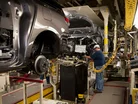MTAA Secures Inclusion of Core Auto Trades on Migration List

The Motor Trades Association of Australia (MTAA) has welcomed the Australian Government's landmark decision to include all core automotive trades in the new Core Skills Occupation List (CSOL), marking a significant milestone for the automotive industry's workforce development.
The automotive industry faces a critical skills shortage that threatens its growth and innovation potential. According to the Institute of the Motor Industry (IMI), the sector is predicted to face a shortfall of 160,000 workers by 2031, with vehicle technicians being the most in-demand role.
Multiple factors, including the rapid transition to EVs, an ageing workforce, decreased immigration and inadequate apprenticeship programmes, are driving the shortage.
The skills gap is particularly acute in EV technology, ADAS systems and software development as modern vehicles become increasingly complex and digitalised.
The shortage impacts profitability for 56% of businesses in the sector and makes it challenging to fill specialist roles, especially those related to hybrid and electric vehicles. As a result, the industry is facing increased labour costs, reduced competitiveness and potential increases in costs for consumers.
The announcement confirms the inclusion of nine essential automotive trades among the 456 occupations eligible under the new Skills in Demand visa and the Direct Entry stream of the Employer Nomination Scheme (subclass 186) visa, effective immediately.
Matt Hobbs, CEO at MTAA, states: "This outcome represents a major victory for the automotive sector nationwide.
"Our comprehensive submission, backed by extensive economic research from Deloitte Access Economics, clearly demonstrated the critical necessity of including these automotive trades in the CSOL."
Validation for MTAA approach
The successful outcome validates MTAA's evidence-based approach, which included detailed wage analysis and industry data highlighting the sector's severe skills shortages.
It further highlights the strength of state motor trade associations (MTAs) and the Victorian Automotive Chamber of Commerce network in presenting member issues and well-crafted solutions to the government.
"The sheer number of businesses and diversity of the MTA member network is the strength of the MTAA. We represent the Australian automotive industry, from dealers to recyclers and everyone in between. This result highlights what can be achieved when we work together as one industry."
The submission demonstrated that automotive trade wages consistently exceed the Temporary Skilled Migration Income Threshold (TSMIT), underlining the sector's capacity to support skilled migration pathways.
"This decision addresses a critical workforce challenge facing automotive businesses across Australia," Matt highlights. "Including these occupations will provide much-needed access to skilled workers, supporting the sustainability and growth of our industry across Australia."
The CSOL forms a key component of the government's reformed temporary skilled migration programme and will operate alongside the new Skills in Demand visa, which replaces the previous Temporary Skill Shortage visa.
MTAA will engage closely with Jobs and Skills Australia and relevant government departments to ensure these reforms effectively address the industry's ongoing workforce needs.
Explore the latest edition of EV Magazine and be part of the conversation at our global conference series, Sustainability LIVE and Manufacturing LIVE.
Discover all our upcoming events and secure your tickets today.
EV Magazine is a BizClik brand.


